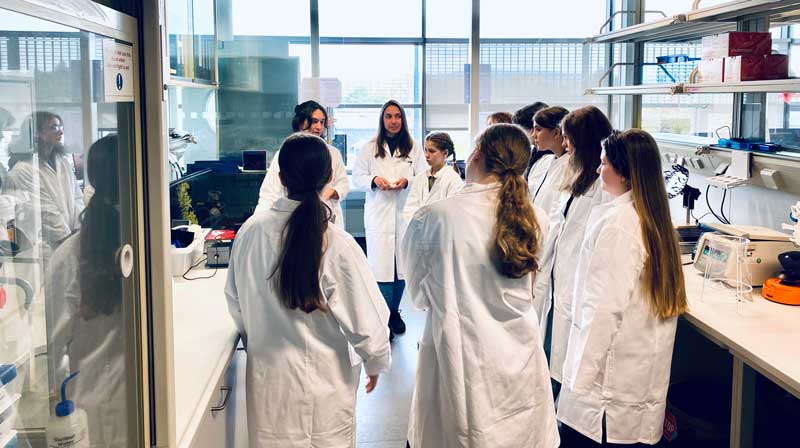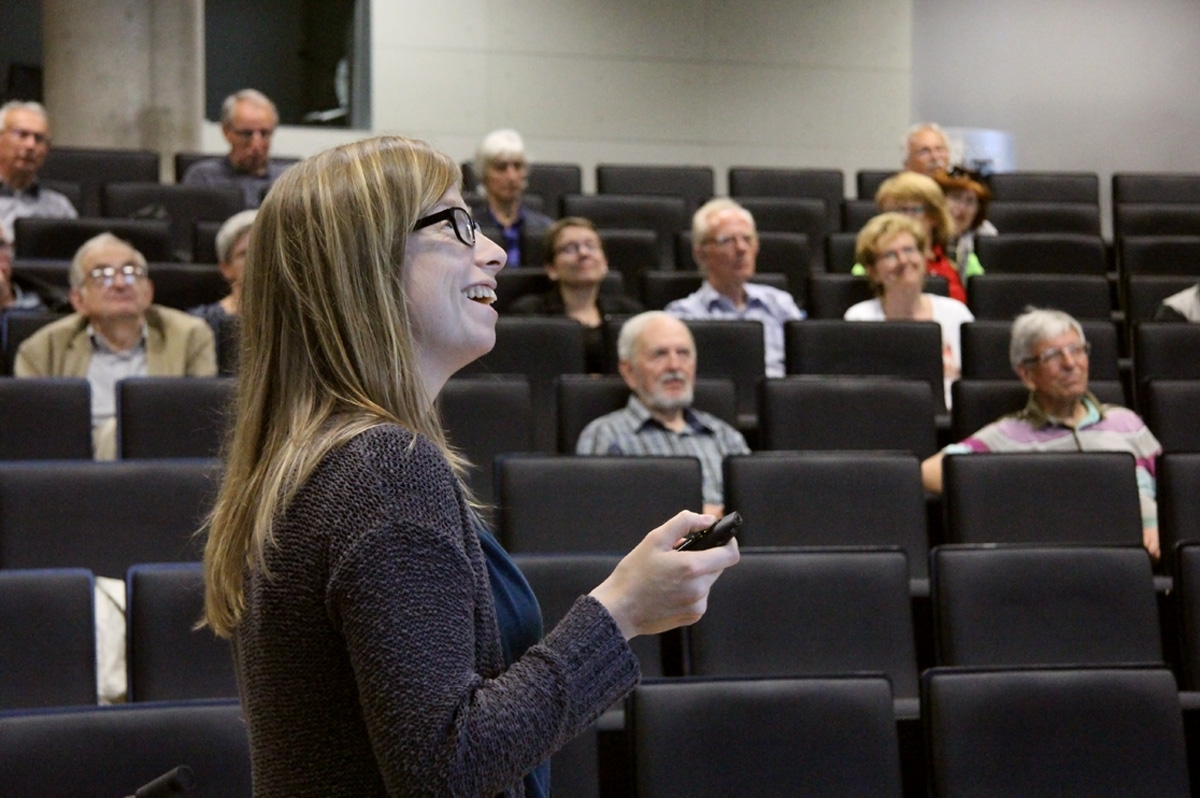We care very much about making science compelling and accessible to the public. This is why we offer a broad range of formats for different audiences. Most of these events are organized together with partners from our scientific network or with local partners. You can find detailed information on upcoming events in the Schedule of Events.
The MPI-CBG offers guided tours for individual groups. All tours are free of charge. A standard tour takes 90 minutes, tours for elementary school kids take 60 minutes and for preschool kids 45 minutes. Groups should not exceed 25 people. Tours generally take place Tuesdays 10am.
If you are interested in joining a guided tour of the MPI-CBG, please send an email to fuehrungen(at)mpi-cbg.de or call Erika Ylagan (+49 351-210 2949).
Guided tours at the MPI-CBG
Look behind the scenes of modern research in a guided tour of the labs of the MPI-CBG. Take this opportunity to learn more about what scientific research really means. See rows upon rows of deep blue tanks with zebrafish in the Fish Facility, live worms crawling under the gaze of a microscope lens, and a beautiful rooftop view of the castles along the Elbe River Valley. Over 50 nations are working here under one roof, in an architecturally-significant building that fosters communication and echoes our flat organizational structure. And watch scientists at work at the institute that was voted the number one place in the world to do a postdoc in the "Best Place to Work" survey and the most family-friendly institution in Dresden in 2012.
Kids tours at the MPI-CBG
Kids of all ages are welcome to explore the labs and facilities at the MPI-CBG. They can learn how scientists work and why we have showers in the labs. They can see the fish facility with zebrafish in 2,500 tanks and feel how cold a cold room is. Kids can also observe worms under the microscope and try some pipetting. After the tour and a short quiz they will receive a certificate that proves they are "MPI-CBG Expert Junior Scientists".
The Dresdner Lange Nacht der Wissenschaften (Dresden Science Night) is Dresden’s major science event. Once a year in summer, 125 Dresden research institutions open their doors between 5pm and midnight for the public to show what they do – with talks, presentations, and science shows in almost 100 locations. More than 30,000 visitors join this event Dresden-wide. The MPI-CBG has been part of this program since the beginning in 2003 and offers spectacular, fascinating experiments, a huge hands-on area for kids, talks, and stations with science presentations hosted by researchers from MPI-CBG labs. A fun summer night with loads of science!
www.wissenschaftsnacht-dresden.de/en/
We are excited to open our doors for Dresden Science Night on June 26, 2026. Stay tuned for our program!
The Girls’ Day is a German-wide campaign, where a wide range of professions and activities is presented to school girls from 5th grade onwards. Companies, businesses and universities all over Germany open their doors to encourage female students to pursue technical professions and fields, where women are still under-represented, such as in the “STEM” fields (Science, Technology, Engineering and Mathematics). Girls´Day is an initiative of the Federal Ministries for Education and Research (BMBF), and for Family Affairs, the Elderly, Women and Youth (BMFSFJ).
We take part in the Girls’ Day every year and encourage the discussion with interested girls, to help overcoming gender imbalances and to support female careers in science. At the MPI-CBG, the girls get a glimpse on how we work and get an opportunity to hear about career paths in science from our staff.


We are not only educating kids, but believe in lifelong learning. This is why we also offer a seminar series for the Seniorenakademie Dresden every semester. This program is targeted at retired people in Dresden, who can enroll and hear lectures and seminars at the Technische Universität Dresden. We joined this program in 2003 and offer a number of talks in German by postdocs and predocs. Actually, we believe that this audience is the best audience! The older ladies and gentlemen are well prepared, ask really tricky questions and will not stop asking until they get what the speaker wanted to get across. So this is a perfect chance for postdocs and also for predocs to learn the basics of science communication by giving a talk in front of a non-scientific audience.
senak.inf.tu-dresden.de/wordpress/
Since 2015, citizens of the city of Dresden, amateur theater groups, dance ensembles and various choirs as well as institutions, associations and the City of Dresden have been inviting to the annual "Dresden eats colorful" event. At a huge star-shaped table, the guests dine in a colorful mixture of conversation, music and dance. The campaign "Dresden Eats Colorfully - A Banquet for Everyone" is initiated by the Cellex Foundation and the alliance “Dresden.Respekt”. It is financed by donations from more than 40 local companies and associations, and supported by over 90 cultural partners.
At the same time, many supporters also come to the city center and join the large group of guests to become part of the colorful, cosmopolitan atmosphere. As a flagship of internationality, the MPI-CBG and the Center for Systems Biology Dresden actively support the event with an own table. International scientists bring their local specialties and share it with the visitors.
www.cellex-stiftung.org/de/projekte/gastmahl

The Dresden Forum on Science & Society was established to foster a discussion of the social, economic, and political impact of modern life sciences.
The Dresden Forum on Science & Society was established in 2004 to foster a discussion of the social, economic, and political impact of modern life sciences. Science & Society is the attempt to establish a dialogue with the public. Moreover, Science & Society wants to raise awareness – especially among scientists – of the impact of scientific research on our society. The series of public seminars is held in English and intends to present a broader perspective on science and also communicate information in a manner that is accessible and comprehensible to members of the public that do not have a scientific background.
16 October 2023
Blame, Responsibility, and Natural Disaster. A Brief History
Prof. Lorraine Daston, Max Planck Institute for the History of Science, Berlin
23 August 2022
Fighting the Myth of Female Inferiority
Angela Saini, journalist and author
24 & 25 May 2022
Cinematic Organisms and The Evolving Traits of the Science New Wave
followed by screening of two of Alexis’ movies: The Fly Room & Son of Monarchs
Alexis Gambis, filmmaker and biologist
more previous seminars
16 July 2021
Volcanoes
Prof. Clive Oppenheimer, University of Cambridge
6 October 2017
Max Planck (1858 – 1947): A Scientist’s Journey from 19th to 20th Century
Prof. Dieter Hoffmann, Max Planck Institute for the History of Science, Berlin
13 June 2017
Reflections on the history of embryology: from the 18th century to the digital embryo
Dr. Janina Wellmann, Leuphana University Lüneburg, Germany
16 June 2014
Communication about biotechnology: What the research tells us
Prof. Dominique Brossard, University of Wisconsin-Madison
27 May 2014
A Life around Biology
Dr. John Tooze
01 April 2014
About the Use, Misuse and Dual Use of Microbial Pathogens
Prof. Stefan Kaufmann, Max Planck Institute for Infection Biology, Berlin
26 April 2013
60 years of the double helix
Seminar series "The History of Science", celebrating 60 years of the double helix dicovery, featuring a movie and talk by Prof. Karla Neugebauer and Prof. Joe Howard about the impact of the publication
05 December 2012
The science of communicating new technologies: What research tells us about what we’ve been doing wrong about bridging science-public divides
Prof. Dietram Scheufele, University of Wisconsin-Madison
15 June 2011
The Molecular Personalisation of Science and Medicine - Current Status and future prospects
Prof. Jonathan Knowles, University of Helsinki
In the DIPP School Project “Science goes to school”, multinational teams of PhD students offer two-hour workshops with hands-on experiments at Dresden schools. After experimental work, PhD students are available for discussion on diverse subjects as science, career models or how foreigners experience living in Dresden. The workshops aim at students from 8th to 12th grade (14 to 18 years), they are being held in English.
In 2011, the DIPP School Project was awarded the “Saxon Integration Award”, which recognizes projects in Saxony that support tolerance and respect for people of different cultural, religious or ethnic backgrounds, and was recognized as “Hochschulperle” by the Stifterverband für die Deutsche Wissenschaft in January 2013.
www.facebook.com/science2school
www.dresden-ipp.de/predocs/science-goes-to-school/
www.dresden.de/de/wirtschaft/wissenschaft/dipp.php
Twitter:@science2school
The Children’s university is organized by the TU Dresden and the Deutsche Hygiene-Museum Dresden. Four times a term, professors, doctors or other experts offer talks for over 500 children, ages 8 to 12. We participated several times with speakers who explained how organisms form or what DNA can tell us about the abilities of creatures.
www.ku-dresden.de